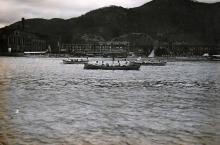27 Jul 1944, Escape from the Japanese
Primary tabs
Goodwin found easy going along a beach that took him past Shatau and onto a long stretch of sand with surf breaking from the sea. He walked easily along this until it ended in a rocky headland. There was no shelter there so he lay down to escape the gusting wind, and to await daylight, feeling absolutely exhausted.
By first light he caught a large crab, and then climbed up a stream to find cover for the day. There were also snails in the stream, which he caught and boiled with the crab, then tried to cook some of the rice which he still had. The snails and crab were edible, but the rice was not, so he settled for drinking the water it was cooked in.
There were sampans out to sea below him, and he was concerned that they might see the smoke from his fire, and come to investigate. There was no problem, though he had an anxious time when two men in a sampan came directly to the beach beneath him, but only to collect water, then row out to sea again. He later inspected a track above him that appeared to be well used, but took a heavy fall as he was jumping from a large boulder. He landed with a thud on his thigh, but fortunately no damage was done. He realised that the track would be impossible to use at night and that he had better stick to the seashore. Then he saw a fisherman standing on the rocks using a circular net. Goodwin waited for quite some time, then decided to descend to the rocks below him, where he could look for oysters. He was working on collecting three of these when he looked up to see the fisherman above him. They greeted each other affably, and he tried to see if there were some fish he could buy using mainly pantomime, but there was no response.
He thought it would be better to move on, and the fisherman turned to head back towards Shatau. Goodwin moved off as quickly as possible, as he was concerned that the fisherman could report his discovery. The way along the coast become impossible when he reached an area of cliff. He had to make his way precariously up through crevasses to the top of the cliff, a climb of about one hundred feet. He almost passed out at one point and waited until he had enough energy to climb slowly uphill to grassy slopes leading to a well-used path. As he moved westwards along the track he passed several women walking in the opposite direction with poles over their shoulders carrying heavy loads of merchandise. They walked singly along the track and passed him with eyes averted.
"From the summit of the ridge a beautiful view of sea and beaches was disclosed, while near at hand, nestled on flat ground close behing the sand, was a sizeable village."
His eyes were definitely not functioning well when he saw three black objects ahead. With difficulty he brought them into focus, and saw there were three men coming towards him.
"As they came closer I felt certain that they were Chinese, and it was obvious that they were very interested in me."
As he walked straight towards them, they appeared to be very much on guard and separated to stand around him. His appearance could hardly have reassured them. Clothes in filthy tatters, with a ten-day's growth of beard covering his gaunt and haggard face.
He motioned towards the village and said, "Any Japanese down there?" One the men answered: "No, No Japanese long time."
He felt immensely relieved, and attempted to engage in a conversation that no-one understood, and it was only through hand-waving and gestures that he was able to inform them that he had come from Kowloon. They understood and seemed to appreciate this, then gave him the message that he should proceed to the village ahead which was called Taimuisha. They could not accompany him as they were apparently had a task, and one of them opened his jacket to disclose half a dozen grenades slung round his chest. If appeared that they were guerillas heading out on a mission.
He set off on his way alone, and walked with some trepidation steadily to the main pathway right into the village. Women and children bolted indoors at the sight of him, but in a central square under a large tree, a number of men gathered round and smiled at him. They had no language that they could converse in, and feeling weak he sat down on a wooden bench under the tree.
As news of his arrival spread, it looked as though the entire population had gathered round.
A voice asked in English:" Where you go ?" to which he replied:"Waichow"
Someone heard the word 'chow' (a slang word for food) and he called out "Wantchee chow?"
He nodded vigorously, for there was nothing he needed more than food to sustain him.
"Immediately they escorted me across the street to a small teashop, and while all those who could not enter gathered round outside, I was given a pot of Chinese tea and four sweet scones. It was the most delicious food one could possibly imagine."
Goodwin was at last able to relax, as the most difficult and dangerous period of his escape was over. He was now among friends, and he would have assistance for the rest of his escape. First from the Kwangtung Peoples' Anti-Japanese Guerilla Unit, then from the BAAG, the RAF and from various military oraganisations. It would take several months for him to arrive safely back in his homeland, New Zealand
His whole book is well worth reading, and I can recommend "Escape from the Japanese" as a very good read. His story is interesting and his style of writing is relaxed and enjoyable.

